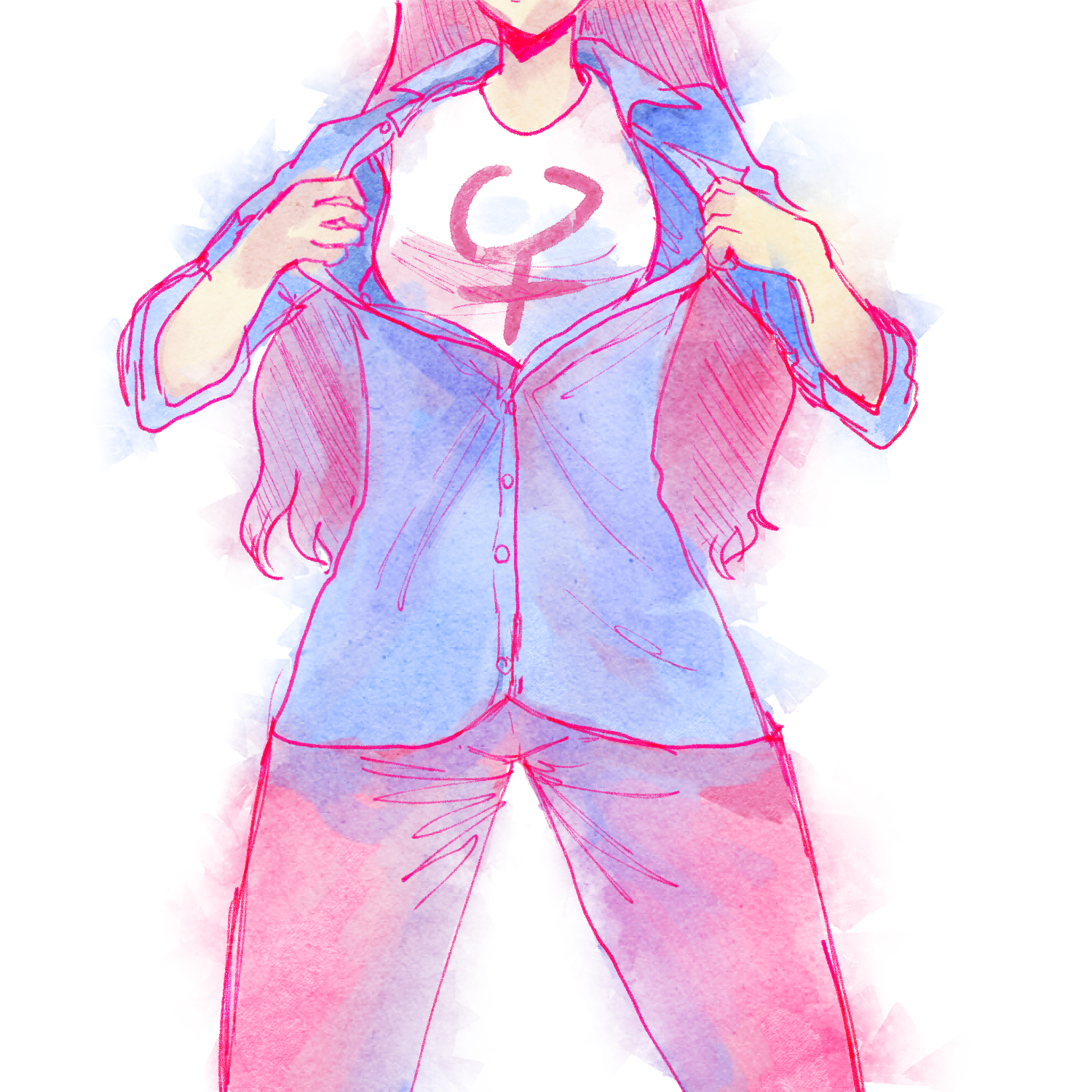I wear my opinions on my sleeve, literally. Fashion can be a useful way of expressing one’s personality, but my clothes spell things out. I am a frequent wearer of T-shirts with clever sayings on them, some innocuous and some overtly political.
“Angry liberal feminist killjoy.” “Cats against catcalls.” “Keep Earth clean, it’s not Uranus.” “Democat.” “Bromance” (with accompanying photo of Vladimir Putin and Donald Trump, both shirtless, writing horseback together. On only one horse.)
Yes, I have noticed that a disproportionate amount of the clothing I own is in some way related to cats. I express myself most effectively with the written word, so it makes sense that my clothes do the same. When I wear these T-shirts, I can express my opinions and my sense of humor. My love of books and cats is apparent, as are my feminist and environmentalist beliefs. All before I say a word.
Wearing these shirts in public, particularly feminist T-shirts, can foster a sense of community founded on shared principles. People occasionally make appreciative comments, laugh, or smile at me for longer than is strictly normal. I’ve also learned that they’re good conversation starters at awkward social events. By putting my feminism out there for people to see, I broadcast my identity. It’s me using my voice, nonverbally speaking up.
Clothing is inherently political. Every time someone asks a rape victim what they were wearing, every time someone assumes that a woman dressing provocatively is “asking for it,” female bodies are objectified and the clothes we wear are politicized. Dress codes in high schools across America contribute to the objectification of women, permitting teachers to deem students too sexually provocative to receive an education uninterrupted by trips to the principal’s office. If society is already going to add political significance to the way women and girls dress, why shouldn’t I do the same in protest?
In high school, the unabashed advertisement of my feminist beliefs led to some intense confrontations with fellow students. I often felt disrespected on a fundamental level simply for sharing my opinion unashamedly. I was frequently asked to justify or explain feminist principles, and my words were examined for the slightest fault to latch onto. On some level, my critics may have been trying to understand, but their predominant motivation was to look for things they could use to justify their own counterarguments, laying rhetorical traps that made every answer wrong.
Wearing feminist T-shirts helped me combat the urge to compromise my principles for the acceptance of people who didn’t really want to understand anyway. Having my opinions literally written across my chest helped me remind myself not to shrink in the face of negative responses or make myself more palatable, my beliefs easier to swallow.
Wearing T-shirts that display my feminism can sometimes alienate or prompt people to make judgments before meeting me. But this doesn’t really bother me. If someone forms a negative judgment about me based on a T-shirt slogan highlighting one of my foundational beliefs (albeit in a whimsical or sarcastic way), I’m not sure they’d like me if they got to know me either.
This is not to say that I would never want to have a conversation with someone who holds an opposing viewpoint. I would love for someone to challenge me based off an intentionally provocative slogan on one of my T-shirts. Sparking conversation is the whole point.
Clothes can be a useful form of protest. Though widely mocked, the pink pussy hats worn by thousands at Women’s Marches across the country the day after the last presidential inauguration have become a symbol of resistance. In 2016, three WNBA teams were fined $5,000 for violating uniform policy by wearing shirts with #BlackLivesMatter and #Dallas5 on them. In the wake of the deaths of Alton Sterling and Philando Castile, the Phoenix Mercury, Indiana Fever, and New York Liberty used clothes to stand in solidarity and protest injustice.
I use fashion to confront the chaos of today’s political climate head on in my daily life, in whatever small ways possible. I am proud to wear my feminist beliefs so openly and brazenly. It’s empowering to defy any who attempt to silence activist voices with words that are impossible to ignore. However, I am not under the delusion that a quip emblazoned on a T-shirt causes concrete change. It’s not enough.
I am trying to be more conscious of the companies from which I purchase clothes, particularly clothes with political slogans on them. If I’m going to talk the talk (figuratively speaking), It’s just as important that I walk the metaphorical walk and support companies working to cause positive change.
There are a number of companies founded upon principles of political activism and raising awareness. For example, Feminist Apparel (a frequent birthday gift destination of mine) sells various types of clothing with feminist slogans and believes that their customers “become ambassadors in their communities for others to come to for dialogue and support.”
In the wake of the Trump administration’s actions to end Deferred Action for Childhood Arrivals (DACA), Feminist Apparel sent out emails calling their customers to action, providing information on how to resist, and asserting that “Immigrants’ Rights are Human Rights.” They launched a new collection called #DefendDACA and are donating 25 percent of the proceeds from this collection to JUNTOS, an immigration rights organization that helps people pay for the costly DACA reapplication fee and works to prevent deportations.
Alta Gracia, an apparel company in the Dominican Republic that employs mostly women, is dedicated to providing all of its employees with a living wage, the amount necessary to meet all basic needs. Employees are paid three times the Dominican Republic’s minimum wage for apparel workers, allowing them the ability to support themselves and their families. Alta Gracia also provides safe working conditions, respects workers’ rights, and ensures dignity for all employees, including an environment free from sexual harassment.
Alta Gracia partners with colleges across the United States, including Georgetown, to manufacture their apparel. They also make our NSO T-shirts. Making deliberate choices when purchasing clothing goes beyond supporting well-intentioned organizations and should include an examination of the conditions under which the clothing was made.
It is essential that we pair awareness-raising with concrete activism whenever possible. The power of conversation should not be undervalued, but those who have the resources to support organizations that fight for positive political and social change should use them. Resistance through fashion must carry over into resistance through action. When I display my feminism across my chest, I don’t have to say a word, but I am refusing to be silenced.





